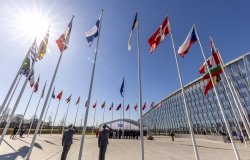Kennan's Diplomatic Doctrine
Winston Churchill famously said in defense of diplomacy, "to jaw-jaw is always better than to war-war." Churchill used this phrase at the White House in 1954 while advocating patience in confronting communism. The diplomacy of the time, the "jaw-jaw," was animated by an idea originating in the previous decade from a telegram composed by a bedridden American diplomat.
In February 1946, George Kennan was suffering from a bad cold and toothache. As deputy chief of mission, he headed the U.S. embassy in Moscow while the ambassador was away. While sorting through various messages, one in particular caught his attention. The Treasury Department had requested an explanation for why the Soviet Union refused to join the newly established International Monetary Fund and World Bank. Rather than dash off a perfunctory reply, Kennan dictated a 5,300-word response now known as the Long Telegram. This document, combined with his "X" article published a year later in Foreign Affairs, would form the basis of the U.S. policy of containment toward the Soviet Union and underpinned many major diplomatic and political initiatives, such as the Truman Doctrine, the Marshall Plan, NATO, and the Berlin Airlift.
How did a deputy chief of mission come to author much of the diplomatic doctrine of that era? Kennan later would argue his writings came along at just the right time to find a receptive audience—but that explains the reception, not the writing. Quite simply, Kennan had a scholar's deep understanding of Russian culture and society, and a diplomat's ability to convey that understanding back home.
As a young Foreign Service officer in Europe in the 1920s, Kennan studied Russia and the Russian language in Berlin. He was tasked with studying Soviet Russia during subsequent postings in the Baltic states, and in 1933 he sat on the delegation to open U.S. diplomatic ties with the Soviet Union. At all of his postings, he traveled as widely as possible to meet people and observe conditions on the ground, recording everything in journals. After leaving the Foreign Service, Kennan flourished as a scholar, authoring 21 books and winning the Pulitzer Prize and National Book Award.
Kennan's genius was expressing his intellect and understanding through the written word in terms that could capture the attention of the policymaker. As Churchill might have observed, he put the "think-think" behind the "jaw-jaw."
Related Program

Kennan Institute
The Kennan Institute is the premier US center for advanced research on Russia and Eurasia and the oldest and largest regional program at the Woodrow Wilson International Center for Scholars. The Kennan Institute is committed to improving American understanding of Russia, Ukraine, Central Asia, the Caucasus, and the surrounding region though research and exchange. Read more










